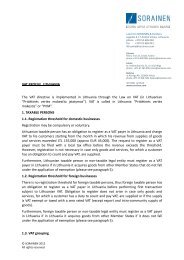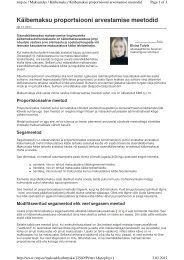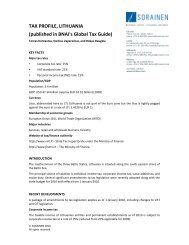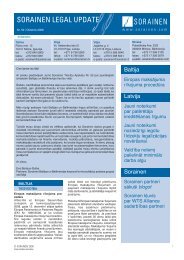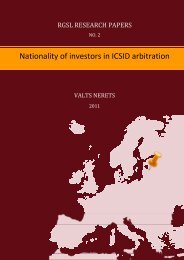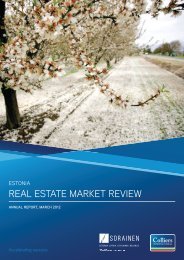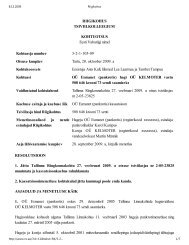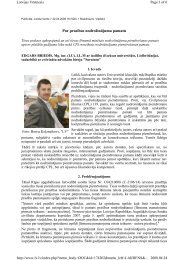Employee Share Plans in Europe and the USA - Sorainen
Employee Share Plans in Europe and the USA - Sorainen
Employee Share Plans in Europe and the USA - Sorainen
Create successful ePaper yourself
Turn your PDF publications into a flip-book with our unique Google optimized e-Paper software.
<strong>Employee</strong> <strong>Share</strong> <strong>Plans</strong> <strong>in</strong> <strong>Europe</strong> <strong>and</strong> <strong>the</strong> <strong>USA</strong>United States of Americapaid by <strong>the</strong> employee to acquire <strong>the</strong> shares) when <strong>the</strong> employeerecognises ord<strong>in</strong>ary compensation <strong>in</strong>come with respect to such shares.• Restricted stock: If <strong>the</strong> employee does not make a Code Section 83(b)election (see paragraph 4.1.1) <strong>the</strong> employer is generally entitled to acorporation tax deduction when <strong>the</strong> employee’s rights to <strong>the</strong> stockbecome substantially vested (e.g. when no longer subject to asubstantial risk of forfeiture <strong>and</strong>/or become transferable). If <strong>the</strong>employee does enter <strong>in</strong>to a Code Section 83(b) election <strong>the</strong> employer isgenerally entitled to a corporation tax deduction at <strong>the</strong> time <strong>the</strong> electionis made. In ei<strong>the</strong>r case, <strong>the</strong> amount of deduction is equal to <strong>the</strong> amountof ord<strong>in</strong>ary <strong>in</strong>come recognised by <strong>the</strong> employee.4.2.2 Social security contributions: At <strong>the</strong> time <strong>the</strong> employee recognisescompensation <strong>in</strong>come (i.e. when <strong>the</strong> stock becomes substantiallyvested, or when <strong>the</strong> employee makes an election under Code Section83(b)) on restricted stock, <strong>the</strong> compensation <strong>in</strong>come will be subject toMedicare <strong>and</strong> social security taxes. Currently, <strong>the</strong> employer's share of(i) Medicare tax is at a rate of 1.45% <strong>and</strong> (ii) social security tax is at arate of 6.2%. Social security taxes are not due on compensation <strong>in</strong>comethat exceeds <strong>the</strong> taxable wage base (currently $106,800 for 2010). (Theactual full rates (<strong>in</strong>clud<strong>in</strong>g both <strong>the</strong> employee <strong>and</strong> employer portions) forMedicare <strong>and</strong> social security taxes are 2.9% <strong>and</strong> 12.4% respectively.However, <strong>the</strong>se rates are divided equally between <strong>the</strong> employer <strong>and</strong> <strong>the</strong>employee).4.3 Tax withhold<strong>in</strong>gThe employer is required to withhold federal (<strong>and</strong>, generally, state <strong>and</strong> local)<strong>in</strong>come <strong>and</strong> employment taxes when compensation <strong>in</strong>come is recognised by <strong>the</strong>employee.5. Taxation of share options5.1 <strong>Employee</strong> tax <strong>and</strong> social security contributions5.1.1 Grant: In general, at <strong>the</strong> time of grant of a share option, (unless <strong>the</strong>option is traded on <strong>the</strong> open market) no taxes will be owed or payable by<strong>the</strong> employer or employee.5.1.2 Exercise:• Non-qualified stock options: The employee would generally haveord<strong>in</strong>ary compensation <strong>in</strong>come upon exercise equal to <strong>the</strong> excess (ifany) of (i) <strong>the</strong> fair market value of <strong>the</strong> stock received upon exerciseover (ii) <strong>the</strong> aggregate exercise price. In addition, compensation<strong>in</strong>come is generally subject to applicable state <strong>and</strong> local <strong>in</strong>cometaxes.UK/1729295/03 206 September 2010



